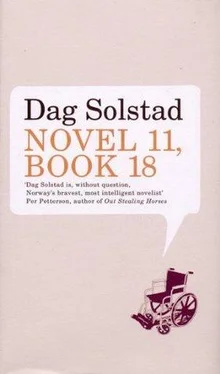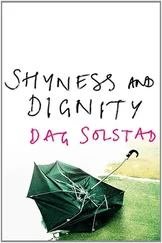Yes, he had remained standing. Bolt upright. In his casual youthful get-up, loose and self-indulgent, and with my facial features, Bjørn Hansen thought. The insult. While his father lugged the two heavy suitcases, Peter kept talking about this insult without a break on their way to the block of flats where Bjørn Hansen lived, as his father let himself in at the entrance door and they passed the letterbox, where his father picked up the mail in passing, went over to the lift, where he pressed the button and they waited for the lift to come, entered the lift, which carried them three storeys up, where they stepped out onto the landing, the son talking until the very moment when Bjørn Hansen unlocked the flat and they entered the hall, where his father put down the two suitcases.
Bjørn Hansen showed Peter the flat. First, the large living room with the balcony facing west, to which he opened the door. Then the kitchen, before barely opening the door to his own bedroom. He let his son inspect the bathroom, then finally opened the door wide to the room he had furnished for Peter. The son had all along nodded approval of what he saw, and this applied also to the last room, with its sofa bed, bookcase, writing desk and chair, chest of drawers and cabinet, as well as an armchair. He said he could well imagine living here. All autumn. Yes, it would feel good not having to walk about trying to find a furnished room. Nice to have one here. But.
‘What is your price?’
‘Price?’
‘Yes, per month.’
The father: ‘Nothing.’
The son: ‘Then it’s a deal. This suits me fine. We are living in a tough world.’
That last remark was made in his usual high-pitched voice, apropos of nothing in particular, and in the preachy manner that Bjørn Hansen had understood was his son’s way of expressing himself. But in this last remark something else had been added: a secretiveness. It was not preachiness in the sense of telling you something for your own good, it was a statement to his father about something he could vouch for, and about which Bjørn Hansen could not have a clue. When he said, ‘We are living in a tough world,’ Bjørn Hansen should not by any means assume that Peter could just as well have said, ‘We are living in a tough world, you know.’ No, these two assertions were like fire and water; moreover, the way the son conveyed his code contained a peculiar kind of pent-up pride.
Peter said he would unpack at once and went into the hall to get the luggage. He placed the suitcases on the sofa bed one after the other before unpacking. In spite of the fact that there were two large cases, Bjørn Hansen noticed with increasing amazement, as his son unpacked and put the things neatly in place, that he had brought almost nothing with him. That is to say, very few personal items. In one suitcase he had practically nothing except bed-linen. A good-quality giant eiderdown took up most of the space. The other suitcase contained mostly clothes. The son sorted them and put them nicely away in the wardrobe and the chest of drawers. Underwear, thin socks, thick socks, handkerchiefs, ties, gloves and mittens in separate drawers. Shirts, coloured and white, in separate drawers in the left section of the wardrobe, T-shirts in a third and sweaters in a fourth drawer of the wardrobe’s left section; trousers and sportswear on hangers in the wardrobe’s right section. He asked permission to hang his outdoor things in the hall wardrobe and did so at once, at the same time putting his shoes there, including two pairs of running shoes besides the pair he was wearing, which he found a place for at the bottom of the right-hand section of the wardrobe. He also had an enormously large toilet bag, which he asked to be allowed to keep in the bathroom. There was barely space for it on the bathroom shelf, which was too narrow for the modern age.
Of personal items there were only three, as far as Bjørn Hansen could make out, which the son handled with great affection, but which utterly astonished his father. First, Peter took out a souvenir from his home town, Narvik. It was an inexpensive thing with a base of imitation silver, on which stood a thin pole of the same imitation silver, and on that pole hung the flag of the city of Narvik. Peter spent a lot of time finding just the right place for this article, but after much toing and froing he decided to give it pride of place on the bookcase. Then he took a beer glass out of the suitcase, from among the clothes (Peter had unpacked these two items before unpacking and arranging his clothes, but after unpacking the suitcase with the eiderdown and the rest of the bed-linen). This beer glass had a special shape, being an accurate replica, in glass, of a boot. ‘A two-litre,’ the son explained, and his father understood that, since he had transported this beer glass (which he noticed had an inscription stating that it belonged to a restaurant in the village where his son had done his military service) by bus and train through most of Norway, it must be associated with a personal experience. Although Peter did not reveal what this was, Bjørn Hansen assumed that it must be one of two things. Either Peter had smuggled it away with him, to the great jubilation of his military chums, after a lively evening at the local pub. Or Peter had impressed them all by tossing off this two-litre glass filled with beer in one draught, without stopping, or he had done so in less time than the others and thereby won the beer boot as a trophy, whether given it by the pub or by his military friends, who had made off with it. Bjørn Hansen did not like to quiz him directly, but tried to worm it out of him by hypocritically showing a great interest in it. This flattered Peter, he could see, but only with the result that his son seemed even more determined to hold on to the mystery of how this two-litre beer boot came to be found in the possession of Peter Korpi Hansen. Therefore he had a tremendously stuck-up air as he tried to find the most suitable place for it. After some more toing and froing, it ended up next to the town flag of Narvik on the top shelf.
Finally, when the two suitcases were empty, Peter revealed the third and last personal item that was to adorn his room in his new life as a student at Kongsberg Engineering College. He took out a tube and rolled out a poster. He hung it on the wall above the sofa bed. After putting it up — by means of drawing pins that Bjørn Hansen had hurriedly produced from a kitchen drawer — Peter took a couple of steps back and admired the poster. Yes, he really admired it. Bjørn Hansen, too, had to come and see it.
It was an enormous poster of a red sports car. Of Italian design. Ferrari. Beside the car, leaning against the door and with his hand self-confidently caressing the chassis, a man in sunglasses. The owner. Sportily dressed. The car was photographed completely open, that is, with the hood rolled back. The background, which was somewhat diffuse, almost desert-like, sandy, emphasised the car’s colour, which was very fine. The image was purely commercial, displaying the car’s dimensions and its gorgeous appearance. There was no trace of irony in the expression of the man next to it, a rarity in modern advertising, just as the image as a whole was totally devoid of irony. It emphasised the expensiveness of the car and, consequently, the power of the man who could lean against it. Nothing else. The absence of irony highlighted the fact that one now found oneself in an atmosphere in which there was no need to put on airs, or apologise with a charming grimace. The raw beauty of wealth. It was gorgeous, and banal. It left only one question: Why had his son brought this poster along and now hung it up on his wall?
The father, however, did not ask any questions about it. And Peter gave no explanation, probably because he thought it spoke for itself. Instead he looked at his watch. He had meant to visit the Engineering College, to survey the situation, as he said. Would look round a bit, drop by the office of the optometry programme in any case, to inform them that he had arrived and accepted the course he had applied for and been assigned to. His father asked whether they should not perhaps have dinner together today, here, in the flat, since it was his first day, but Peter could not. He had too much to do, he said, so he did not know when he would be back. The son left and, shortly afterwards, Bjørn Hansen left too. For the office. He came back at the usual time. Prepared dinner, ate it, put the dirty dishes in the dishwasher and settled down with a book. Naturally he felt in a peculiar state of mind, restless, preoccupied and without a clue as to how he should handle this new turn of events in his life.
Читать дальше












